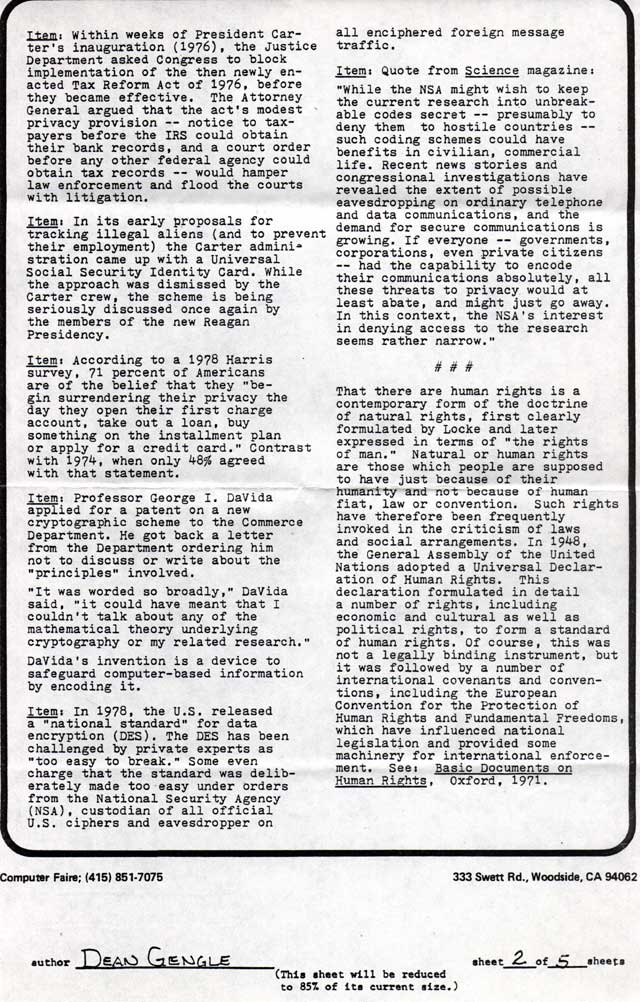CommuniTree

TOWARD AN ELECTRONIC BILL OF RIGHTS
Item: Within weeks of President Carter's inauguration (1976), the Justice Department asked Congress to block implementation of the then newly enacted Tax Reform Act of 1976, before they became effective. The Attorney General argued that the act's modest privacy provision -- notice to taxpayers before the IRS could obtain their bank records, and a court order before any other federal agency could obtain tax records -- would hamper law enforcement and flood the courts with litigation.
Item: In its early proposals for tracking illegal aliens (and to prevent their employment) the Carter administration came up with a Universal Social Security Identity Card. While the approach was dismissed by the Carter crew, the scheme is being seriously discussed once again by the members of the new Reagan Presidency.
Item: According to a 1978 Harris survey, 71 percent of Americans are of the belief that they "begin surrendering their privacy the day they open their first charge account, take out a loan, buy something on 4k-.he installment plan or apply for a credit card.,, Contrast with 1974, when only 48% agreed with that statement.
Item: Professor George I. DaVida applied for a patent on a new cryptographic scheme to the Commerce Department. He got back a letter from the Department ordering him not to discuss or write about the "principles" involved.
"It was worded so broadly," DaVida said, "it could have meant that I couldn't talk about any of the mathematical theory underlying cryptography or my related research.,,
DaVida's invention is a device to safeguard computer-based information by encoding it.
Item: In 1978, the U.S. released a "national standard" for data encryption (DES). The DES has been challenged by private experts as "too easy to break." Some even charge that the standard was deliberately made too easy under orders from the National Security Agency (NSA), custodian of all official U.S. ciphers and eavesdropper on all enciphered foreign message traffic.
Item: Quote from Science magazine: "While the NSA might wish to keep the current research into unbreakable codes secret -- presumably to deny them to hostile countries such coding schemes could have benefits in civilian, commercial life. Recent news stories and congressional investigations have revealed the extent of possible eavesdropping on ordinary telephone and data communications, and the demand for secure communications is growing. If everyone -- governments, corporations, even private citizens -- had the capability to encode their communications absolutely, all these threats to privacy would at least abate, and might just go away. In this context, the NSA's interest in denying access to the research seems rather narrow."
That there are human rights is a contemporary form of the doctrine of natural rights, first clearly formulated by Locke and later expressed in terms of "the rights of man.,, Natural or human rights are those which people are supposed to have just because of their humanity and not because of human fiat, law or convention. Such rights have therefore been frequently invoked in the criticism of laws and social arrangements. In 1948, the General Assembly of the United Nations adopted a Universal Declaration of Human Rights. This declaration formulated in detail a number of rights, including economic and cultural as well as political rights, to form a standard of human rights. Of course, this was not a legally binding instrument, but it was followed by a number of international covenants and conventions, including the European Convention for the Protection of Human Rights and Fundamental Freedoms, which have influenced national legislation and provided some machinery for international enforcement. See: Basic Documents on Human Rights, Oxford, 1971.